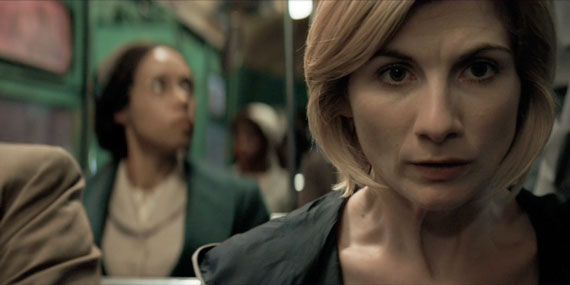In Rosa, the new Doctor Who series provided a solid and simple basis for explaining the business of alternate history. On a cultural level, the episode spoke volumes – that in a single small, but significant, act the course of history can be changed. The butterfly effect shows that the changes can be planetary in the act of altering one thing; the impact here isn’t wiping out the dinosaurs, but – as the Doctor said – the downstream effect would be universal.
Small Pebbles
In creating your own adventures for Renegade, or any other time travel game for that matter, you can leverage a similar concept – the impact of small changes. In some instances, the change will require the characters stop someone or something to allow events to proceed as history records (like the event in Rosa).
Others will involve removing someone from history altogether. That doesn’t necessarily mean killing them off; it could mean diverting their timeline along another path. Intervention might mean they choose another career, failed to get the exams they needed to attend university, or enrolled in the armed forces. Or perhaps the change happened to a significant figure’s father or mother, meaning that they move to some distant country, raise their children to believe something fundamentally different, or choose not to have a family at all.
The interaction between the player characters and the antagonist(s) will mean they have to find a way to keep the target on the intended path; usually, they will have complications to overcome to manage this. They have to find a way to maintain the current time-stream, which might mean tough choices and hard calls (again, like the events in Rosa, which clearly generated a lot of internal conflict and emotional distress).
Tough Choices
Akin to Rosa, the sort of scenarios that arise from nudges to the timeline can lead to decisions that necessitate inhumane (or even inhuman) acts. Against every reasonable principle, the Doctor and companions had to keep quiet and allow events to continue. A greater impact for the players can arise when they know someone has to die, especially if during the course of the adventure they get a chance to know and like them.
The other wrenching decision comes when the player characters have to allow someone to survive. Sometimes the awful antagonist at the heart of the event must continue to exist because the ripples they create generates a greater good; in the short term that might mean suffering, horrors and death. That can be a truly horrible realisation. A lot of people will die, with absolute certainty, but the outcome will be positive in the fullness of time.
The long game – the ripples finally hitting the shoreline – might seem like a cruel point upon which to set one’s sights, but that’s the weight that a time traveller must carry. Non-interventionist policies may arise for exactly this reason, because action taken with good intentions may have massive side effects.
Many Routes, One Destination
A further challenge for those attempting to resolve an alteration comes from the fact that the antagonists may have many choices to achieve their goal, whereas the player characters will have only a single option – to prevent history coming off the rails.
Rosa provided a view of this dilemma because it was easier to complicate the journey than to keep it on track. In addition, if the player characters face an opponent already in place, the antagonist has the upper hand in preparation.
The matter gets more complicated if you have time travel work with a free-form approach. A game like Timemaster, Continuum or Timewatch use time travel in the most fluid sense, where you can set traps, run rings, and loop back on yourself (and your enemy) to make things harder or try again with another pass. That makes matters ever more complex and runs the risk of generating knots in the time-stream impossible to unpick. Once you have run across your own path more than a couple of times, you begin to lose the angles for a simple solution.
As a Gamemaster, you should approach this kind of time travel activity with caution and very careful notes. It matters that you know where and when everyone is, because next loop around that will be a new wrinkle to smooth in an already challenging situation.
Lessons in Who
With Rosa, Chris Chibnall has completed the Doctor Who Time Travel 101, running through the basics of characters, universal truths and the heart-breaking complexity of time travel. I think that combined with introducing a new Doctor, these stories have worked really well – and I look forward to moving forward from here.
You can pick up a copy of the Renegade rules as part of the sci-fi event generator Brace for Impact on RPGNow and DriveThruRPG. You can also find the unformatted and complete rules on this website.

